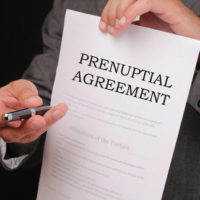Are There Limits to What I Can Put in My Prenuptial or Postnuptial Agreement?

Prenuptial and postnuptial agreements remain one of the best ways for couples to ensure that their property and assets are distributed properly and fairly in the event of a divorce. While these agreements allow the parties to include details about how specific assets will be handled upon divorce, there are certain things that cannot legally be included in a prenuptial or postnuptial agreement. Couples who include these prohibited provisions could have their agreement declared invalid, so if you are considering entering into a prenuptial or postnuptial agreement, it is important to first consult with an experienced prenuptial and postnuptial agreements lawyer who can ensure that the agreement is properly drafted and doesn’t contain any prohibited provisions.
Prohibited Topics
There are a few specific issues that cannot be included in prenuptial or postnuptial agreements, one of which is child custody, so any provisions related to the care of a couple’s children after divorce will be declared invalid. In fact, prenuptial and postnuptial agreements can only include information about financial matters and so should not include terms related to family matters, physical arrangements, or employment. Instead, these issues will need to be settled outside of court or by a family law judge. It is permissible, and even encouraged, however, for couples to grapple with issues like spousal maintenance in addition to property division when drafting a prenuptial or postnuptial agreement.
Declaring an Agreement Invalid
Including prohibited matters in a prenuptial or postnuptial agreement will result in those parts of the agreement being thrown out by the court. It is, however, also possible for an agreement to be declared invalid in its entirety. For example, all prenuptial and postnuptial agreements must be properly signed and witnessed and if this is not done, the agreement can be thrown out. Similarly, a court may find a document invalid if:
- One party was not represented by independent counsel;
- One or both parties didn’t fully disclose their financial situation; or
- One party was forced to sign under duress or didn’t have the mental capacity to agree to a legally binding contract.
In fact, even if a document is signed and witnessed and both parties disclosed all necessary information and were represented by counsel, a court could still declare the agreement invalid if the terms of the agreement are deemed unfair or ridiculous. This is known as an unconscionable contract and in these cases, courts can either throw out the whole agreement, limit application of the troublesome provision, or eliminate only the unconscionable portion of the document. This can have important repercussions for both parties to an agreement, so if you have concerns about your own prenuptial agreement, please contact an experienced attorney who can advise you.
Call Today for a Free Consultation
If you are considering entering into a prenuptial or postnuptial agreement in Fort Lauderdale, please contact dedicated family law attorney Sandra Bonfiglio, P.A. at 954-945-7591 to ensure that your interests are protected and the document is legally binding.
Resource:
floridabar.org/news/tfb-journal/?durl=%2FDIVCOM%2FJN%2FJNJournal01.nsf%2F0%2F4f89d12898331bd08525729100707692







